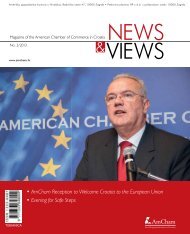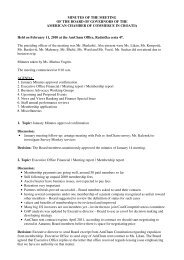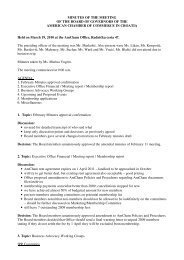News&ViewsreportNEW EMPLOYMENT INCENTIVES ANDPAYROLL PROCEDURESBy Ana Grubešić, Wolf Theiss Rechtsanwaelte GmbH - Zagreb Branch››› Ana Grubešić,Zagreb officeAccording to the statistics <strong>issue</strong>dby the Croatian Employment Bureau in April,the number of unemployed persons in Croatiais higher than 300,000, 60,000 of which arepeople younger than 24 and 140,000 of whichare the long-term unemployed. On the otherhand, evasion of the payment of mandatorycontributions by the employers is wide-spread,which causes direct damage to the state budgetand to the employees. New measures haverecently been adopted in order to tackle withthese <strong>issue</strong>s.Employment IncentivesThe Croatian Parliament recently adopted the Employment IncentivesAct which introduces incentives for employing inexperienced or longtermunemployed workers and for engaging volunteers. The procedurefor employing agricultural seasonal workers is also simplified. It is expectedthat employers will have a great interest in these incentives. Theact is effective as of 31 May 2012.If an employer employs a person who has no working experiencein his or her profession and less than one year of total workingexperience, or a person who has been continuously unemployed formore than two years, the employer may be relieved of paying a portionof the social and health insurance contributions, which would result insaving approximately 13% of total salary costs, for a period of up to twoyears. An employer may use <strong>this</strong> exemption if it regularly pays salaries,contributions and taxes, and if it does not reduce the number of employeesthrough business related dismissals during the period of theexemption. A failure to comply with these conditions during the term ofthe exemption will result in an obligation to pay all previously exemptedcontributions.Any person without working experience in his or her professionand with less than one year of total working experience, under thefurther condition that they have a (x) college education and are under30, or (y) high school degree in a trade and are under 26, is eligiblefor a volunteer training program previously only available in the publicsector. Such volunteers will receive a monthly income from the CroatianEmployment Agency in the amount of HRK 1,600 (approx. EUR 210).The employer would be obliged to pay monthly social insurance contributionsin the amount of approximately EUR 70 but such contributionswould be refunded. If the volunteer has up to one year of workingexperience, but not in his or her profession, the employer is obliged topay an additional, non-refundable monthly health insurance contributionin the amount of approximately EUR 50. The employer is obligedto assign tasks to the volunteers which are related to their professionand must provide them with a mentor. Such training may last one yearfor college educated volunteers or two years for high school educatedvolunteers. In order to participate in <strong>this</strong> program an employer mustregularly pay salaries, contributions and taxes in respect to its otheremployees and it must not reduce the number of employees throughbusiness related dismissals during the period of its participation. Trainingprograms must be approved by the Croatian Employment Agency.A daily work agreement for a seasonal worker in agriculturemay be validly concluded simply by sticking a value coupon on astandard work agreement before the start of each working day. Thisrepresents payment of daily mandatory insurance contributions and allowsgreater flexibility in planning working activities which are often dependenton uncertain weather conditions. A person may perform suchwork for up to 90 days per calendar year. Such work does not affect theofficial status of unemployed or retired persons.New Rules for Salary PaymentsThe Croatian Government recently put into effect the Regulation onpayment of social and health insurance contributions which compelsbanks to supervise payment by their account holders of mandatory socialand health insurance contributions and enables the Croatian TaxAuthority to block the bank accounts of non-complying employers. Theregulation is effective as of 1 May 2012.The new law contemplates the Tax Authority creating and regularlyupdating a list of employers that do not duly deliver ID forms orhave outstanding mandatory contribution payments. This list will beperiodically delivered to all banks.If a listed employer holds an account with a bank, that bank isobliged to follow a special procedure when that listed employer paysout salaries. When ordering payment of a salary, the listed employermust simultaneously order the payment of the associated mandatorycontributions from the same bank account. If the listed employer doesnot comply, the bank must block payment of the salary and immediatelynotify the Tax Authority. Upon receiving such notice, the Tax Authoritywill order the blocking of the applicable bank account(s) with immediateeffect in order to enforce payment of the contributions.Employers that have been properly paying out their requiredcontributions may generally continue with their current payroll practices.The regulation does not affect payment of contributions for selfemployedpersons and expert trainees.18 ISSUE 2/2012
eportFATCAand its implications forthe financial servicesNews&ViewsBy Dženet Garibović,Manager, PricewaterhouseCoopersThe Foreign Account Tax Compliance Act (“FATCA”) was enacted underthe Hiring Incentives to Restore Employment (“HIRE”) Act of 2010 toprevent tax evasion by US persons through foreign financial institutions.On February 8, 2012, the U.S. Treasury and the Internal Revenue Service<strong>issue</strong>d proposed regulations that provide details of the provisions containedunder FATCA. The regulations will significantly affect many financialinstitutions worldwide and in <strong>this</strong> region as well. The US Internal RevenueService (“IRS”) believe that many US citizens are evading US taxes by hidingtheir assets overseas through Foreign Financial Institutions (“FFIs”).FFIs are financial institutions outside the US, who hold financialinstruments for investments which benefit another person. Thisgenerally includes banks, insurance companies, investment funds, likehedge funds, and some other asset managers and custodians. In orderto avoid FATCA imposing 30% US withholding tax on certain payments,FFIs must comply with due diligence procedures. These proceduresare designed to identify and report information on US investors whohave invested in either non-US financial accounts or non-US entities,and withhold on certain investors who do not provide information. Inessence FATCA determines that all financial institutions worldwide willhave to pass information about US clients to the US tax authorities.The due diligence, withholding tax and information reportingrequirements pursuant to FATCA implementation are expected to significantlyaffect the business practices, policies and procedures, andsystems of foreign financial institutions. FATCA compliance poses substantialbusiness and operational challenges from the identification anddocumentation of customers, to the FFI’s on-boarding and IT systems.It will have impact on tax, legal, back-office administration, operations,and other functions in the FFI and take substantial time and resources toaddress. FATCA will come into force on 1 January 2013.The governments of the US, France, Germany, Italy, Spain andthe United Kingdom (“the FATCA partners”) released a Joint Statementin February 2012. The Joint Statement’s purpose is to ensure betterinternational tax compliance and faster and easier implementation ofFATCA. This can be achieved by automatic exchange of information ona reciprocal basis under the existing bilateral tax treaties and by using ajoint approach with regard to the supply of data to the authorities of theFATCA partner country. FFIs in the FATCA partner countries will be ableto report the information required to be compliant under FATCA to theirlocal government agencies, as opposed to the IRS directly. Other countriesare expected to follow suit and seek to become FATCA partnersin the near future. However, it remains to be seen whether <strong>this</strong> bilateralapproach will significantly reduce the burden of FATCA compliance forFFIs or whether it may make compliance by FFIs more challenging. TheIRS is expected to <strong>issue</strong> a final regulation on FATCA <strong>this</strong> summer.2/2012 ISSUE 19













